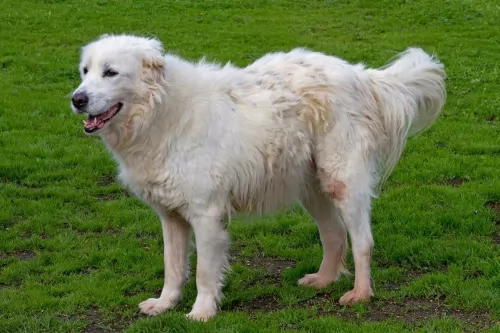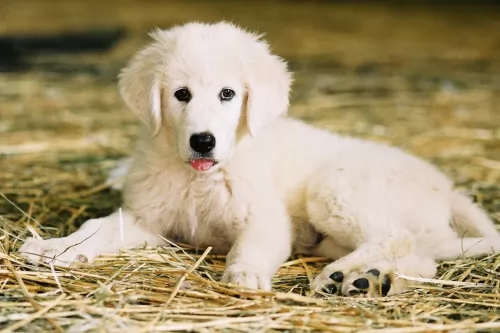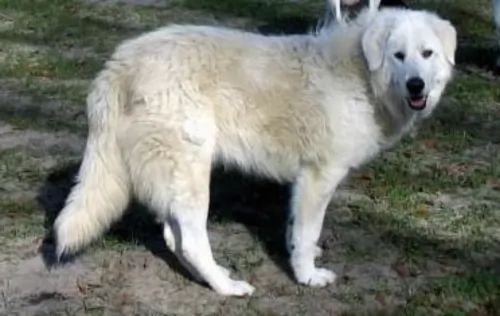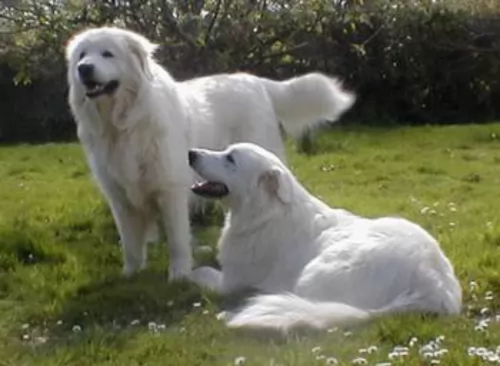 Petzlover
Petzlover Abruzzenhund is originated from Italy but Bakharwal Dog is originated from India. Both Abruzzenhund and Bakharwal Dog are having almost same height. Abruzzenhund may weigh 9 kg / 20 pounds more than Bakharwal Dog. Both Abruzzenhund and Bakharwal Dog has almost same life span. Abruzzenhund may have more litter size than Bakharwal Dog. Both Abruzzenhund and Bakharwal Dog requires Moderate Maintenance.
Abruzzenhund is originated from Italy but Bakharwal Dog is originated from India. Both Abruzzenhund and Bakharwal Dog are having almost same height. Abruzzenhund may weigh 9 kg / 20 pounds more than Bakharwal Dog. Both Abruzzenhund and Bakharwal Dog has almost same life span. Abruzzenhund may have more litter size than Bakharwal Dog. Both Abruzzenhund and Bakharwal Dog requires Moderate Maintenance.
 Abruzzenhund was established as an individual breed in the middle of the 20th century. They are descendant of the big, white Eastern sheepdogs which came to Europe 2000 years ago. Abruzzenhund is a mix of Turkish sheepdogs Akbash and Karabash, the Kuvac, Slovakian breed Hungarian breed, Komondor, and a French sheepdog Pyrenean Mountain Dog. Those dogs were much bigger than today’s breed. Abruzzenhund is still not very popular breed, but it is very common in Great Britain and Italy. They have been used as guard dogs, hunting dogs, and working dogs because they are very brave and strong.
Abruzzenhund was established as an individual breed in the middle of the 20th century. They are descendant of the big, white Eastern sheepdogs which came to Europe 2000 years ago. Abruzzenhund is a mix of Turkish sheepdogs Akbash and Karabash, the Kuvac, Slovakian breed Hungarian breed, Komondor, and a French sheepdog Pyrenean Mountain Dog. Those dogs were much bigger than today’s breed. Abruzzenhund is still not very popular breed, but it is very common in Great Britain and Italy. They have been used as guard dogs, hunting dogs, and working dogs because they are very brave and strong.
 The precise origin of the large Bakharwal Dog is undocumented. It is believed the breed originated from the Tibetan Mastiff, the Molosser, the Tuvan Sheepdog and others. It is an ancient working breed where it has been bred for many centuries by the Bakarwal and Guijar tribes. The dog is thought to be the rarest of all the ancient herding breeds.
The precise origin of the large Bakharwal Dog is undocumented. It is believed the breed originated from the Tibetan Mastiff, the Molosser, the Tuvan Sheepdog and others. It is an ancient working breed where it has been bred for many centuries by the Bakarwal and Guijar tribes. The dog is thought to be the rarest of all the ancient herding breeds.
The Bakharwal is an indigenous breed of Himalayan origin, being bred exclusively by those wanting a strong, brave dog to protect their livestock. Today Jammu and Kashmir in North India is predominantly the stronghold of this breed.
The Bakharwal dog today as we know it is a muscular dog, tall and powerful and with a thick, fluffy coat. He has remained a livestock guardian or herding dog for the people occupying the Pir Panjal mountain ranges for centuries.
Unfortunately the breed’s rarity as well as his lack of recognition has put this attractive dog in danger of becoming extinct, and in fact steps have been taken to have the dog listed as an endangered species. The females only produce small litters of between 1 to 3 puppies. There are currently no breeding clubs for the Bakharwal Dog and the other sad aspect is that the breed isn’t recognized by any of the major kennel clubs.
 A height of Abruzzenhund variates between 60-73 cm, males are slightly bigger than females. While the weight is 30-45kg, again, males are heavier than females.
A height of Abruzzenhund variates between 60-73 cm, males are slightly bigger than females. While the weight is 30-45kg, again, males are heavier than females.
Abruzzenhund lifespan is between 11-13 years, but since these dogs don’t have any weaknesses and don’t tend to get sick, they can live longer with a proper care and adequate food and training.
Litter size of Abruzzenhund depends, but as any large breed, they usually have 6-9 puppies. And that is a very good considering size of the breed.
Abruzzenhund is not the only name of this breed. There are more names that you might hear. You can hear names like Maremma, Pastore, Abruzzese, Cane da Pastore, Maremmano- Abruzzese, Italian Sheepdog, and many similar names. Basically, they sound similar but there are differences.
Abruzzenhund is a friendly dog, but it is very powerful. Very strong jaw with a scissors bite makes them very strong. They have small but intelligent eyes, usually dark colored. The undercoat is dense, while the coat is white with segments of ivory to white yellow. Their long undercoat and coat make them winter resistant.
 This dog is large, heavily boned, muscular and with a deep chest. They’ve got large heads and a thick, muscular neck. The nose is black, the almond-shaped brown or amber eyes gentle while the ears are medium sized and drooping. The tail is long and bushy and mostly curls over the back of the dog. Their thick coats are available in a number of colours such as cream, tan, white, black and piebald.
This dog is large, heavily boned, muscular and with a deep chest. They’ve got large heads and a thick, muscular neck. The nose is black, the almond-shaped brown or amber eyes gentle while the ears are medium sized and drooping. The tail is long and bushy and mostly curls over the back of the dog. Their thick coats are available in a number of colours such as cream, tan, white, black and piebald.
The Kashmiri Sheepdog has long legs and although a number of sizes exist, the regular height of the dog is roughly 61 to 76 cm.
Known also by several other names such as the Kashmir Mastiff, Kashmir Sheepdog or Bakarwal Mastiff, this dog is well known for his ferociousness, and guarding his human family is taken seriously. His courage knows know limits and he is both protector and friend, a loyal and devoted companion.
He forms a strong bond with his human family and is good natured with well behaved children who have been taught to treat animals with kindness. Caution should always be practised with small children as this is a large dog. He is playful, social and adaptable with his human family but won’t take kindly to other pets. Socialization and training are important for this strong-willed dog.
 Abruzzenhund is a very well-balanced breed who loves spending time with other animals and people. They have a very good temper. They love being around families, and they are very gentle with children. It is important to train Abruzzenhund properly because the dog of that size should be a leader. A human with a strong character should train this breed. Training is important because they tend to make their own decisions which can be bad sometimes.
Abruzzenhund is a very well-balanced breed who loves spending time with other animals and people. They have a very good temper. They love being around families, and they are very gentle with children. It is important to train Abruzzenhund properly because the dog of that size should be a leader. A human with a strong character should train this breed. Training is important because they tend to make their own decisions which can be bad sometimes.
 Bred exclusively as a livestock guardian dog, the large Bakharwal is a steadfast, loving, brave guardian. He is good with people of all ages and will protect his human family with his life.
Bred exclusively as a livestock guardian dog, the large Bakharwal is a steadfast, loving, brave guardian. He is good with people of all ages and will protect his human family with his life.
To this day the breed has a strong herding and guarding instinct, and because he is a large breed with herding instincts, he won’t be suited to apartment living. He needs a good sized garden to run in and will require exercising to stave off frustration and boredom.
Look after your Bakharwal well, especially as there aren’t many of them left. Loved, nourished and cared for, he’s just waiting to make you part of his ‘flock’ and in exchange he’ll be your loyal and devoted friend who will protect you with his life.
 Your Bakharwal puppy will need to see the vet for a complete check up and to receive his puppy vaccinations. These innoculations immunize your puppy from hepatitis, distemper, leptospirosis, parvovirus and parainfluenza.
Your Bakharwal puppy will need to see the vet for a complete check up and to receive his puppy vaccinations. These innoculations immunize your puppy from hepatitis, distemper, leptospirosis, parvovirus and parainfluenza.
As he grows older, you’ll need to keep his teeth free from dental plaque by using a special dog toothbrush and toothpaste.
Ticks and fleas – speak to your vet about the most effective way to treat these parasites. heartworm – this is important if your dog is exposed to lots of mosquitoes. Heartworm infestations are potentially deadly. spaying and neutering is important at 6 months of age to protect your pet from unwanted puppies and disease.
 They learn very quickly, but it requires strong will and constant training to keep them happy. They are great working dogs, and with the positive training, they are amazing. It is very important that they follow rules and to keep them in balance with training.
They learn very quickly, but it requires strong will and constant training to keep them happy. They are great working dogs, and with the positive training, they are amazing. It is very important that they follow rules and to keep them in balance with training.
They can eat a lot of food, depend on their activity. High-Quality dog food twice a day for a grown dog is a must. While puppies should eat 3-5 times, smaller portions of food. The food is important especially for working dogs, they need up to 2000-3000Kcal per day. Abruzzenhund will enjoy eating meat with a lot of vegetables and oil.
They are not recommended for small house or apartment. They need big yard because they require a lot of space. During the winter they can be outside because of their coat, but during the summer they need to be in the shade with a lot of fresh water available anytime.
The coat should be brushed and groomed very often because they have a thick coat. There is a lot of dead and loose hair in it. During shedding, period takes even more time to groom your dog properly. They love and they need exercise. Mental exercise is important as physical. Every day walking, running, playing with other animals is an important part of dog's activity. When they get enough quality exercise, they will sleep in the house.
 The coat of the Bakharwal Dog is thick, flat and of medium length and he is a relatively low maintenance dog. Brushing the dog’s coat twice a week will be adequate to remove loose hairs, although professional grooming can be a good thing as the density of the coat makes trimming the coat a necessity. The eyes, ears, teeth, and nails of the Bakharwal Dog should also be examined regularly just to ensure no health problems develop.
The coat of the Bakharwal Dog is thick, flat and of medium length and he is a relatively low maintenance dog. Brushing the dog’s coat twice a week will be adequate to remove loose hairs, although professional grooming can be a good thing as the density of the coat makes trimming the coat a necessity. The eyes, ears, teeth, and nails of the Bakharwal Dog should also be examined regularly just to ensure no health problems develop.
Bakharwal puppies from 8 to 12 weeks will require meals 4x a day. From 6 months on he can start having 2 meals a day. Top-quality dry- or wet dogfoods will guarantees balanced nutrition, and speaking to your veterinarian will give you an idea of what is best for your canine friend. To ensure your dog doesn’t suffer with a dry, scratchy skin, remember to include raw- and cook meat into his food. Protein is an essential ingredient for the health of your dog. Always ensure clean, cool water is available and wash food- and water bowls regularly.
Make sure your Bakharwal Dog gets plenty of exercise every day to maintain good health. Take him for walks to give him new sounds, smells and sights.